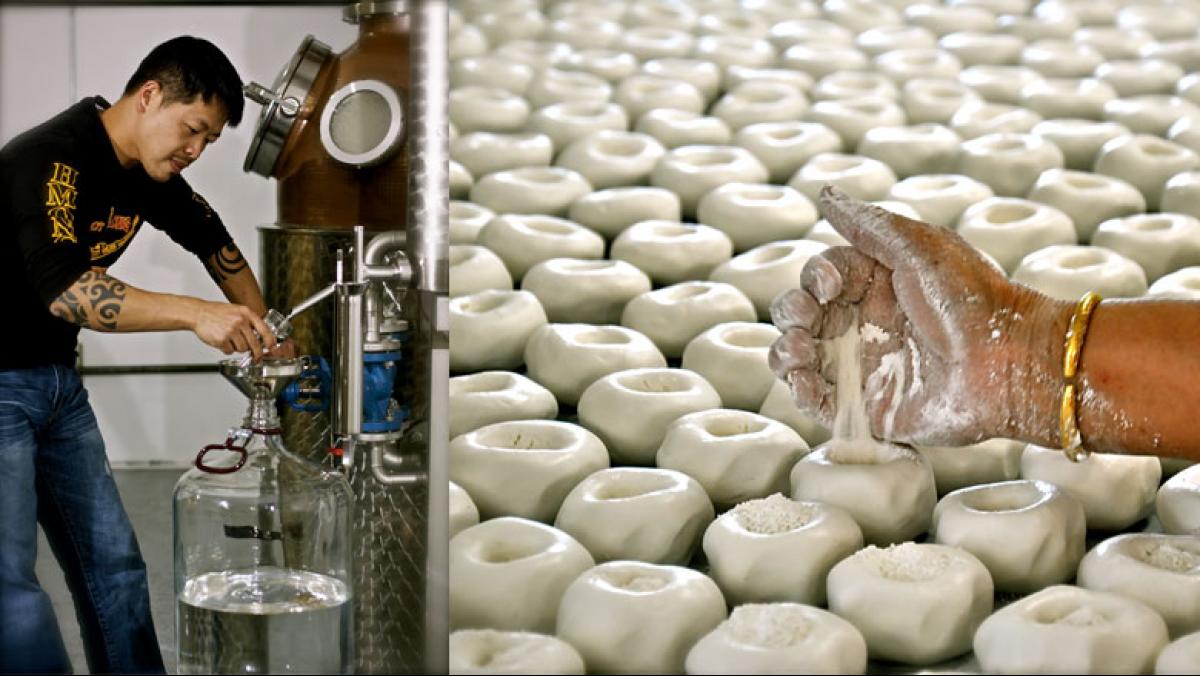If you ever grow tired of the typical brandy old-fashioned sweet, you might want to try Po Lo’s exotic twist on Wisconsin’s state cocktail. His Yerlo Old Fashioned features a 90-proof whiskey called Yerlo X made from rice.
Lo, who is of Hmong descent, says that while the rice spirit is traditionally drunk straight at room temperature, “nowadays there are a lot of ways to drink it.”
“I like to keep it in the freezer. When you pour it out, it comes out nice and thick like maple syrup,” says Lo, noting how the cold enhances the flavor.
Using a recipe passed down from his mother Yer Lo, Lo makes three distinct varieties of rice-based spirits at his distillery on a quiet rural road in the Town of Brussels in Door County.
The 120-proof liquor called Yerlo, Lo’s flagship brand, is named in honor of the woman from whom he learned the art and science of making rice liquor. Then there is Yerlo Reserve, a 130-proof rice spirit featuring a picture of Po Lo in traditional dress on the bottle. His newest product, with a picture of his mother in traditional dress on the label, is Yerlo X rice whiskey—the one that makes a mean Old Fashioned.
“The whiskey is my top of the line,” he says. “We create a 90-proof rice spirit and age it for five months in oak barrels to get the caramel color. It has oak, vanilla, butterscotch, and jasmine. We don’t [have] any additives. That’s the beauty of the oak barrels we use.”
Next up, Lo says, is the release of a 180-proof liquor that he promises will surprise with its smoothness and drinkability.
“You’ll never come across another product that is 180-proof that tastes like this,” says Lo. “When you hear 180-proof, people are thinking, Man, it’s like gasoline. But it’s not. It’s got so much flavor. There’s no tannin to it. It’s sweet and flavorful. But it is an acquired taste.”
There is not much to see inside the 5,500-square-foot building where Lo produces what he believes to be the only commercially available traditional Hmong liquor on the planet.
A small German-made copper still that looks like it might have come out of a Jules Verne novel catches the eye, but beyond this the only thing to see inside Lo Artisan Distillery are rows of plastic barrels where water, sweet Thai rice, and Yer Lo’s secret recipe rice-yeast cakes ferment for up to six months before the liquid is distilled and hand-bottled.
The response to Lo’s rice liquors has been phenomenal in Wisconsin and beyond. “I found it … a good niche because nobody else was doing it. So I took it and ran with it,” says Lo of his booming enterprise. Because of a growing following in states with a high concentration of Hmong people, Lo’s rice liquors are hard to find in Minnesota and California as well as in Wisconsin.
An estimated 180,000 Hmong refugees came to this country, mostly sponsored by American churches, during the 1970s and 1980s. California, Minnesota, and Wisconsin have the highest Hmong populations, and the Minneapolis-St. Paul area has come to be known as the Hmong capital of America. With their strong work ethic and tight-knit families, the Hmong fit right in with the traditional values of the Midwest.
Po Lo’s story is a fairly common one among Hmong-Americans. His father, Chong Lo, worked with American forces during the Vietnam War. After the fall of Saigon, Hmong families fled their native lands in the hills of Laos for fear of retribution from Communists for supporting the Americans during the war. Many Hmong died trying to cross the Mekong River, which separates Laos and Thailand. Those who made the crossing were sent to crude and crowded refugee camps.
Lo and his family spent a couple years in a Thai refugee camp before a church group sponsored their transition to a new life in the United States in December of 1979. The Lo family went to live in Massachusetts. In 1983, when Po Lo was nine years old, the family moved to Green Bay.
“Coming here at a very young age, I didn’t really know anything,” Lo says. “But the English language was picked up easily. My family adapted well because we had some family here. My father had a job opportunity here … and [we] made it our home.”
Gregarious and charismatic, Lo got along well with other children at school. Too, as Lo is fond of saying, “It helps that I talk a lot.”
Growing up in Green Bay, Lo says he wanted what other Wisconsin children wanted: “a good-paying job [and to] buy a little house and raise a family.”
According to Lo, Hmong can be very insular. But he wanted to share his culture with the rest of the world. After marrying and moving away to Louisiana, Lo struggled to reconcile this insularity and his entrepreneurial spirit. “You try to find your skills and what you want to do,” he says.
Tight-knit family ties brought Lo back regularly from Louisiana to Green Bay. “Every time I would come, I would come at the right time, when my mother would make her rice liquor,” he says, pointing out that homemade rice liquor is a fact of life for most Hmong. Yet little is known about the liquor—let alone the distilling process—outside the Hmong community.
“I would see her [making the liquor] and got interested. [Then] I would ask her if she ever thought of doing it legally,” he says with a chuckle. “The older generation, they don’t know any rules, laws, or regulations, or any kind of ways to make it legal. So they just don’t [make it for others]. … One day I told her, why don’t we just do it legally? I’ll find a way to do it. A year later we were formed.”
In 2011 Po Lo fired up the still at Lo Artisan Distillery and began to commercially produce rice liquor from his mother’s recipe. He had found the perfect location for his factory in a small farming community in Door County, just north of his Green Bay home. In addition to being the right space for his craft distillery, Lo says the Town of Brussels location offers the perfect summer breezes necessary for making his mother’s sweet rice-yeast cakes. These cakes help to ferment the fragrant Thai rice that he turns into alcohol.
Lo compares what he is doing at Lo Artisan Distillery to what some southern moonshiners have done with their secret recipes. “I have some friends down south, and this is just like how they do their moonshine. It’s part of their history, part of their family,” he said. “Yerlo is the same way for me.
Lo sees his business as a cultural breakthrough for the Hmong.
“[Rice liquor] is the traditional drink among Hmong and in other Asian countries. We celebrate with it, weddings and funerals,” he says.
Though there were many home distillers, Lo wanted to take production to the next level and offer it to the world. “Here,” Lo wanted to say, “this is something we have in our tradition and it’s fantastic.”
Success brings joy to Lo, and it also drives him to “work even harder to make the product and [even] come up with new products.”
In April 2015, Lo satisfied another passion by opening a restaurant in Green Bay called The Pho Lodge, featuring a deeply savory Vietnamese broth and rice noodle dish known as pho.
“This is just one of my other side hobbies,” says Lo. “I opened this up because there’s not a single good pho restaurant in town. I went and learned [how to cook pho] from an 85-year-old Vietnamese chef up in the northwest states,” he says.
Even though both businesses are thriving, Lo regards them as hobbies.
“It’s not for money or fame. It’s not getting me anywhere right now other than having the joy from people who love it and having something different and unique,” he said. “I love it. It’s like they say, If there’s one job that you would work for free, what would it be? This is mine.”




